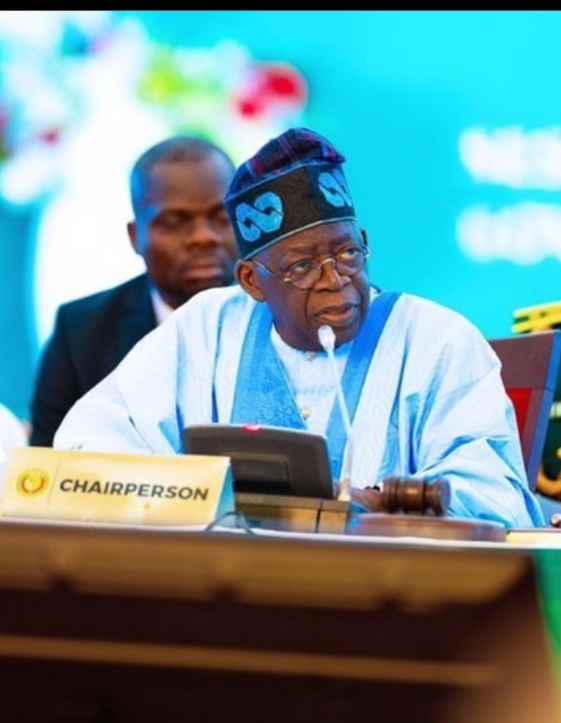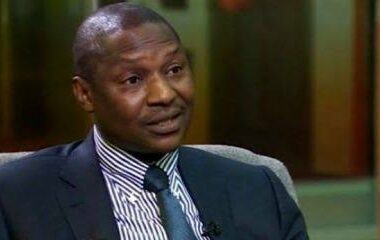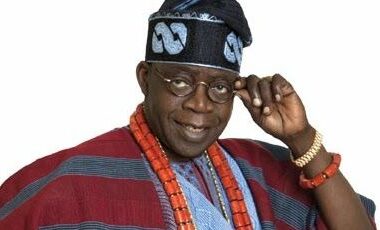Nigeria’s current challenges, and the excruciating impact they are having on the majority of Nigerians at the moment, are no laughing matter. They call for the most intense bouts of soul-searching and a unique set of actions and, attitudes on the part of the people and those who lead them.
Tough times don’t last, someone famously said; tough people do. But what do tough people do during tough times? For one, they understand the wilderness, how and from where they got there, and what lies beyond it. Rather than wallow in self-pity, recriminations and blame, they understand that to overcome in this life, we sometimes have to undergo. Beyond the wilderness, tough people know and Scripture says, lies the Promised Land.
That was essentially the thrust of the Presidential Address delivered the other day by President Bola Ahmed Tinubu – in which he spoke with candor about Nigeria’s economic difficulties and what he intended to do about them.
More importantly, the President punctuated his speech by telling Nigerians how he personally felt about the difficulties they face. Why is this significant? In the presidential system of government such as the one we run at present, the President wields enormous executive power, and his actions -for good or for ill – are far-reaching and incredibly impactful.
But his role is also a highly symbolic one. Like other intangible attributes, mere symbolism is for the most part incapable of influencing immediate outcomes. But it is capable of influencing opinions and perceptions. And in modern society, perception matters to a great degree. The ability to influence it positively is crucial, not just the success of transactions both in business and interpersonal relationships, but also to good governance. It is sometimes as crucial, perhaps, as the ability to command actions and consequences.
President Tinubu seems to understand this principle and the need to communicate it as the need arises – a far cry from his immediate predecessor, for example, whose taciturnity and failure (or refusal) to engage the masses on the issues that concerned them bordered on disdain – if not arrogance. This President seems to understand that we are at a crossroads at a time when we need the leader of our commonwealth and the father of our nation to project and communicate empathy, sincerity of purpose, readiness to serve, dedication and love for his people – while at the same time demonstrating the attributes of a strong leader, such as courage, decisiveness, practicality, vision, focus and the sense of responsibility necessary to get things done.
That understanding was apparent from the beginning of the Presidential Address to its end.
Revisiting the vexed issue of oil subsidy removal, Tinubu restated his position on the issue, lamenting the billions of naira that have been lost over the years to a small group of powerful and unelected individuals, rather than expended on the generality of the people. This group of individuals, he said, had become a threat to the fairness of the economy and the integrity of democratic governance in Nigeria. The country, he said, will never progress as an economy and as a democracy as long as such groups are allowed to wield an outsized influence over our political economy and the institutions that govern it.
In view of the foregoing, though, there are those who believe that simply alerting Nigerians to the existence and power of such a cabal (without actually identifying its members by name) achieves little or nothing towards making sure that their whims (as the President put it) do not hold sway over the hopes and aspirations of the many. Such secretiveness about their identities does nothing to restore sovereignty to the people, to whom it rightly belongs.
In a country as unequal as Nigeria, a country with a constantly shrinking middle class (where you’re either very rich or very poor) hearing a President talk about fairness and economic justice in such robust terms as Tinubu did in his Address is like an oasis in a parched desert. Previous leaders tended to avoid those words, and the commitment they implied, like a health hazard.
But such noble concepts as equity, fairness and justice should not reside only in the realm of sentiment; they must be brought into the arena of public action. As with the end of the fuel subsidy regime, the President has shown similar decisiveness with other measures such as ending the multiple exchange rate regime of the naira in a bid to reform the economy for the long-term good of the people and fighting against glaring imbalances that had long plagued the economy and jeopardized general welfare. Ending the fuel subsidy and the preferential exchange rate system, Tinubu said in his speech, are no less than a fight to define the fate and future of our nation and to correct the defects of an economy that has immensely profited a tiny elite (the ‘elite of the elite’, as he called them).
The President’s repeated use of the word, ‘fight’ in his Address is quite instructive. To many, the use of militant language is incongruous with the desire to achieve peace and harmony. However, a story goes that a student of Chinese martial arts once asked his master, “Master, why do you preach peace all the time, and yet are teaching me how to fight?” To which the master replied, “Because it is better to be a warrior in a garden than to be a gardener in a war.” Anybody – whether a social investor, or activist, or even a President – who seeks to help the vulnerable in society by whittling down the unearned privileges of the rich will have a fight on his hands. The previous administration made a mantra out of the phrase ‘Corruption Fighting Back.’ Unfortunately, that is the truth; privileged groups do not simply decide to give up the ‘miliki’ they have enjoyed for so long out of the goodness of their hearts. They are MADE to do so – but not without a fight. A fight President Tinubu seems willing and ready to take on.
As Nigerans endure untold hardships, with food and fuel gone through the roof, as households and businesses struggle, and as the future looks uncertain, Tinubu offers, in his Address, a bucket list of issues his government will be fighting to achieve in the face of the odds.
They include:
– arrangements for a new palliative regime, this time with the active buy-in and participation of subnational governments;
– a more liberal tax regime, as witnessed by the President’s signing, earlier this year, of four Executive Orders meant to address unfriendly fiscal policies and multiple taxes that are stifling the business environment (including the suspension and deferment of some taxes to provide the necessary headroom for businesses, especially in the manufacturing sector, to thrive and grow);
– proposals for the expenditure of N75 billion between July 2023 and March 2024 for the funding of 75 promising enterprises ((ie N1bn per enterprise, at an interest rate of 9% p/a and a maximum of 60 months repayment for long-term loans and 12 months for working capital;
– plans to energize the MSME ecosystem (which the President rightly recognizes as a driver for sustainable growth) with funds to the tune of N125 billion;
– plans to fund 100,000 of these MSMEs and start-ups with another N75 billion – so that each enterprise gets between N500,000 and N1million at highly favorable interest and repayment rates;
– plans to host a multi-stakeholder engagement with farmers’ associations and operators within the agricultural value chain, in a bid to ensure that prices of food items remain affordable. In pursuit of this objective , the President has already ordered the release of 200,000 metric tonnes of grain, along with 225,000 metric tonnes of fertilizer and seedlings from strategic reserves at moderate cost to farmers pan-Nigeria who are committed to the administration’s food security agenda;
– plans to support the cultivation of 500,000 hectares of farmland – to which end the Tinubu administration will disburse N200b according to laid-down criteria;
– plans to optimally deploy the expertise of development finance institutions, commercial as well as microfinance banks to develop a viable and appropriate transaction structure for all stakeholders;
– plans to invest in a massive revamping of the country’s decaying healthcare and educational infrastructure;
– plans to roll out affordable mass transit buses across the states and LGAs – to which end the Tinubi administration will invest N100b between now and March 2024 to acquire 3000 units of 20-seater CNG-fuelled buses to be shared to major transportation companies in the country according to well-spelt-out criteria;
– plans for an upward review and immediate implementation of the minimum wage, with the active collaboration of labor unions in the country;
– plans to make education more affordable to all via loans to students in institutions of higher learning who have need of them; and so forth.
Because leaders are human, like the rest of us, even the most high-minded of plans and programmes will sometimes fall short. But it was the Italian philosopher, Dante, who reminded us that ‘though leaders make mistakes, and governments do err, the occasional omissions of a government that acts in the spirit of charity are better than the constant neglect of a government frozen in the ice of its own indifference. ‘ There is no denying the fact that Nigerians have had their fair share of indifferent and negligent governments at all levels in the past. While it is understandable to feel disappointed at the shortcomings already recorded even during these early days of the Tinubu administration (most notably the unfortunate time-lapse between the removal of fuel subsidy) and the implementation of its other plans as enumerated above) it is however heartening to see that the President himself graciously acknowledged it in his Address with a quasi-apology – albeit with a pledge to move speedily with the task of redressing the problems created by the time-lapse, as well as confidence that all of the government’s plans, programmes and projections will deliver the desired outcomes, and Nigeria will sooner than later exit the storms and turbulence of the moment.
Speaking of storms and turbulence, the economy faces two key concerns which – though the President did not directly mention them in his Address – pose a clear and present threat to the success of his agenda. One is the issue of our borders. The peremptory manner in which the previous administration shut those borders down, though with the best of intentions, has turned out to be an ill-advised and ultimately counter-productive exercise. The Tinubu administration must now do the reverse, but with safeguards that prevent smugglers, cattle-rustlers and other criminals, not to mention terrorists and the like – from breaching our frontiers, making nonsense of our territorial integrity and endangering our farmers and their crops.
Another clear and present danger is the recent coup d’etat in the Republic of Niger, Nigeria’s neighbor to the north. In recent years, there has been a rash of coups in the West African sub-region – with countries such as Mali, Burkina Faso and Guinea already under the jackboots of soldiers. Although each of these takeovers – and the consequent disruptions of constitutional order – are a setback for democracy, the rule of law and the independence of the judiciary which we Nigerians hold dear, none of them threatens Nigeria like the putsch in Niger.
In fact, it is not only Nigeria that feels threatened by the Niger coup. Even before it took place, the Sahel Region (ie the mostly semi-desert area that spans Africa from east to west, just south of the Sahara Desert) was already the world’s foremost hotspot of jihadism, featuring al Qaeda and ISIS affiliates and the Nigeria-based Boko Haram, and the fear now is that the coup will worsen insecurity in the area and spread beyond the Sahel.
Having condemned the coup, leaders of the Economic Community of West African States (ECOWAS) under the chairman of Nigeria’s President Tinubu have proposed a range of measures (including economic sanctions and the possibility of armed intervention) to reverse the situation and bring about the reinstatement of the deposed President. Although, as already mentioned, the situation threatens the security of our country on so many levels, the onus of military intervention must be as a last resort – and certainly not at the behest of France, the USA or any other world power, whose interest is not so much the preservation of democracy or peace, but simply the protection of their interests in Niger’s mineral wealth, the country being one of the world’s top producers of uranium.
The call by the aforementioned world powers on Nigeria in particular to intervene militarily in Niger, therefore, must be taken with a pinch of salt. Such an action by Tinubu would amount to doing the dirty work on behalf of international players who have exploited that country and its minerals for years (and in the case of France, used Niger and other francophone countries to try to whittle down Nigeria’s influence in the sub-region). If France and the US see no other option at this point than military action, they have to do the job by themselves; they certainly have the resources to execute such an operation. This shouldn’t be another proxy war – with Nigerian soldiers as cannon fodder.
In these times of political flux in many Western countries – where the electorate has lost its appetite for prolonged foreign wars and the inevitable body bags bringing home dead soldiers -one can understand Western desire for a third party to take up the Niger challenge. But the West should understand that Nigeria is also battling her own internal challenges – insecurity among them. Not to sound churlish, but the Tinubu administration must remind the West that Nigeria has hardly enjoyed any significant assistance from the West in the fight against insurgency (other than selling us hardware now and then). In essence, they watched the proliferation of insurgency across the Sahel and Northeastern Nigeria – but hardly lifted a finger to halt its march, even with bases located in Niger and Chad!
If, however, military intervention is inevitable – and Nigeria sees a clear role for itself in it – then there has to be a negotiated agreement on a modus operandi that benefits all parties going into the battle. The West has to pull its weight this time around.
Dialogue, however, remains the best option. As he has done since his inauguration, and now in his role as ECOWAS chairman, the Nigerian President has the opportunity to take his winning-hearts-and-minds approach beyond the shores of Nigeria, with a view to restoring calm and purpose to a troubled sub-region, as he is doing for his troubled country – with courage and empathy.






